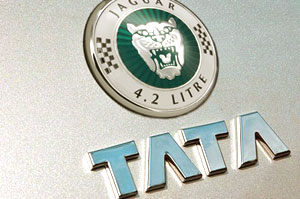Jaguar’s new Indian owner, Ratan Tata was quick to reassure employees, aficionados and customers that the acquisition of marquee British car makers Jaguar and Land Rover would not bring noticeable change.
He said that the ownership would be non interventionist and non integrationist. That Tata Motors is producing the world’s cheapest car, the Nano, should have no impact on Jaguar and Land Rover products.The managing director of factory owned Jaguar Land Rover Australasia, David Blackhall, sees the $2.3 billion buyout, which comes into play on June 1, as “only positive”.“There’s a lot that can be done with these brands now that the uncertainty has gone,” says Blackhall.The public won’t observe anything significant. Existing dealers will still be selling Jaguars and Land Rovers, and the brands will still be distributed by JLRA with a team led by Blackhall.The existing Jaguar product line-up, boosted by the arrival of the modern mid-sized XF, will be no less familiar.It will be business as usual with the big difference being that Jaguar and Land Rover now have assured futures, although there have been some concerns that the Tata Group (the parent of Tata Motors and India’s biggest industrial conglomerate}may have bitten off more than it can chew.Positively, however, Land Rover’s fortunes have improved and it made a profit of about $1.5 billion last year). But Ford tossed about $10 billion into Jaguar during its 18-year-long headache. A reliance on traditional, pin-striped luxury has now been dumped in favour of a more sporting, stylish, younger positioning exemplified by the XF.Interestingly, the Tata purchase of Jaguar and Land Rover hasn’t raised many eyebrows in Britain where the Indian parent company already has significant holdings in non-automotive businesses.“With Tata taking over, it’s almost like the British are getting Jaguar back,” says the Jaguar Land Rover boss, and not only because of the traditional connection between the Mother Country and India. Tata already owns a host of British companies including Tetley tea and major steel operations. It has a big UK presence in research and development with a global IT base there.Tata also has a Ritz-Carton hotel holding in the US.Tata emphasises that Jaguar and Land Rover will continue to be produced out of their British factories. Mr Tata has made it clear that the origins of the brands are important. Don’t expect Indian-made Jaguars or Land Rovers…Nor an army of Indian executives.Mr Tata, a dignified and worldly gentleman of 70 (and a man who might well have been a target market for Jaguar in the past), is already taking steps to retain the essential DNA of the Jaguar and LR brands. And to retain or improve their competitiveness.“I am told there are detailed flow-on technical partnership agreements to guarantee platforms and engines for some time,” says Blackhall, adding that the company also has an excellent R&D facility of its own in the UK.Mr Tata had recently dined with Geoff Polites, who was the boss of Jaguar Land Rover until his death. The new owner asked Polites to stay on and continue to run the company with the existing seasoned management team, and the Australian was keen to remain in the job, health issues permitting.On Polites’ death, the Jaguar Land Rover CFO, David Smith was appointed acting CEO and is tipped to take the job permanently.It’s too early yet to know if Tata has grand product plans for Jaguar. Blackhall says that in the medium term, Jaguar probably has its products locked in. Longer term, though, anything’s possible. He sees Porsche as the company model for any small luxury car-maker like Jaguar, which sold 70,000 units in 2008 (Land Rover is up closer to 240,0000. Profits ahead of volume could be the credo.“If I were running these brands, I wouldn’t rule out anything,” he says.And, speaking of Porsche, he would personally love to see Jaguar produce a “smaller, focussed two-seater sports car that is true to the brand”.He wants Jaguar to recapture the territory it held in the 1950s and ’60s when it was an acknowledged leader in dynamic and stylish sporting luxury cars.The new XF model is chasing younger, more sporting buyers and is the most contemporary Jaguar to emerge in a long time.“[Stylist] Ian Callum has done a great job is consigning retro to the past,” is Blackhall’s verdict on the modern look of the Jaguar rival for the 5 Series, A6, E-Class and GS.“This is a key car for us, a breakthrough car.”Blackhall observes that today’s car business is a complex one. It’s no longer a case of building the right car and the customers will come. “There’s a lot going on with the environment, fuel reserves, regulations, and petrol prices. Carbon will drive many product decisions over the next five years.“Jaguar Land Rover has committed 700 million pounds to researching and developing alternate engine strategies and finding solutions. We have to be on the front foot.Blackhall is upbeat about the future under Tata but also remembers its most recent owner Ford with affection. Ford Motor Company bought Jaguar in 1990 for $2.5 billion. “Ford was terrific; it stepped up every time, despite its own problems.”Blackhall reminds us that in the 1960s-70s-80s, Jaguar could have fallen over permanently and become another casualty like Vanguard, Hillman, Riley, Sunbeam…Just in the last few days has come news that Tata is to take a share in Pininfarina as the iconic design studio sets up a centre for research, design and engineering in India.Tata will support this facility with contracts and participate with a minority interest although Pininfarina, best know for its work designing Ferraris, will be the majority shareholder with management responsibility.Tata has also indicated an interest in purchasing a stake in Ferrari.





